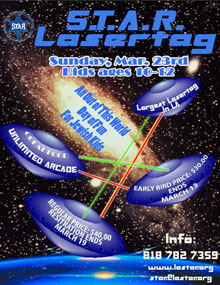
Teen San Diego Bash
September 19-21
Ages 13-18 (Mitzvah & Haverim)

New Years in Newport
September 14, 2014
Ages 7-12 (Tikva & Aviv)
Bamidbar
S.T.A.R. News & Events
Here are S.T.A.R.’s upcoming exciting events:
Six Flags Madness June 8th 2014!
MAGEN TEEN ISRAEL TRIP JUNE 18 – JULY 9, 2014
SOLD OUT!!
This Shabbat
Friday Candle Lighting: 7:15pm
Shabbat Ends: 8:16pm
Torah Message
I-Sight
You shall not hate your brother in your heart. (19:17)
One of the most difficult emotions to deal with is resentment.
Resentment can come from many different sources. It can result from someone genuinely wronging us. Or we may feel wronged by someone even though an objective third party would say that we were being over-sensitive. Resentment can come from plain old jealousy – someone is brighter than us, or seems to have an easier life, or is more successful. Or resentment can come for no good reason at all. It may result from the way that someone speaks or dresses or expresses himself. As they say in the North of England, "It’s the way he hangs his face".
The spiritual masters teach that this is the worst kind of hatred. In Hebrew it is called Sinat Chinam, literally Free Hate. Hate that has comes from no injustice, real or perceived, but just the way someone is.
"You shall not hate your brother in your heart."
In this weeks Torah portion the Torah categorically prohibits that gnawing worm called resentment.
Fine.
The Torah says that we mustn’t feel resentment. But isn’t that more easily said than done? How are we supposed to put this into action?
First of all, we cannot work on our feelings until we understand them. This requires objectivity and the help of someone who is impartial to help us objectivize our emotions. Only when we can delineate our feelings will we have a chance of changing them.
If this analysis shows that we have been genuinely wronged, the proper mode of conduct will depend on the circumstances. It may involve a direct confrontation, or a rebuke from a third party, or legal recourse in Beit Din religious court. When we act to deal positively with our resentment in one of these ways, the poison of the resentment is very often vitiated or extinguished.
However, there may be circumstances where a genuine grievance has no outside recourse and we may just have to forgive and forget. In this last scenario (and in the others too), we should remember that it is G-d who runs the world and we should analyze why G-d has put us in our present situation.
As far as jealousy is concerned, we should remember that each of us is on our own separate monorail in life. The fact that someone else has something that I don’t have, be it brains or money or looks, in no way means that they are taking away from me. The root of jealousy is a lack of trust in G-d’s Providence. Each of us is born with unique capabilities with which to fulfill our potential in this world. If G-d hasn’t given me something, it’s because I don’t need it to complete my mission on this earth.
And as far as Sinat Chinam is concerned, we should remind ourselves that we are all created in G-d’s image. If there is something that I hate about my fellow for no objective reason whatever but just because it’s “the way he hangs his face” it means that I am despising the image of G-d Himself.
However, if we look carefully with a positive eye at those whom we resent, and try and divorce our egos from our emotions, we might begin to see all kinds of positive traits that they possess.
It all depends on our I-sight.
Rabbi M. Weiss Rabbi Y. Sakhai
Community News
Em Habanim Congregation
Weekly Parashat Hashavua class with Rabbi Joshua Bittan on Wednesdays at 8:30pm for more info. visit www.emhabanim.com
****
Avot Ubanim Program has started for fathers and their kids of ages 4 and up every Saturday night from 7:30pm – 8:30pm, Lots of prizes and great Pizza every week!
****
Em Habanim Sephardic Congregation is pleased to make available its elegant venue for your celebration. Excellent location with easy access to freeways. For more info. visit emhabanim.com
Matot July 18, 2014
S.T.A.R.’s upcoming exciting events:
- Event 1
- Event 2
This Shabbat:
- Friday Candle Lighting: 7:15pm
- Shabbat Ends: 8:16pm
Torah Message:
I-Sight
You shall not hate your brother in your heart. (19:17)
One of the most difficult emotions to deal with is resentment.
Resentment can come from many different sources. It can result from someone genuinely wronging us. Or we may feel wronged by someone even though an objective third party would say that we were being over-sensitive. Resentment can come from plain old jealousy – someone is brighter than us, or seems to have an easier life, or is more successful. Or resentment can come for no good reason at all. It may result from the way that someone speaks or dresses or expresses himself. As they say in the North of England, “It’s the way he hangs his face”.
The spiritual masters teach that this is the worst kind of hatred. In Hebrew it is called Sinat Chinam, literally Free Hate. Hate that has comes from no injustice, real or perceived, but just the way someone is.
Bamidbar May 23, 2014
S.T.A.R. News & Events
Here are S.T.A.R.’s upcoming exciting events:
Six Flags Madness June 8th 2014!
MAGEN TEEN ISRAEL TRIP JUNE 18 – JULY 9, 2014
SOLD OUT!!
This Shabbat
Friday Candle Lighting: 7:15pm
Shabbat Ends: 8:16pm
Torah Message
I-Sight
You shall not hate your brother in your heart. (19:17)
One of the most difficult emotions to deal with is resentment.
Resentment can come from many different sources. It can result from someone genuinely wronging us. Or we may feel wronged by someone even though an objective third party would say that we were being over-sensitive. Resentment can come from plain old jealousy – someone is brighter than us, or seems to have an easier life, or is more successful. Or resentment can come for no good reason at all. It may result from the way that someone speaks or dresses or expresses himself. As they say in the North of England, "It’s the way he hangs his face".
The spiritual masters teach that this is the worst kind of hatred. In Hebrew it is called Sinat Chinam, literally Free Hate. Hate that has comes from no injustice, real or perceived, but just the way someone is.
"You shall not hate your brother in your heart."
In this weeks Torah portion the Torah categorically prohibits that gnawing worm called resentment.
Fine.
The Torah says that we mustn’t feel resentment. But isn’t that more easily said than done? How are we supposed to put this into action?
First of all, we cannot work on our feelings until we understand them. This requires objectivity and the help of someone who is impartial to help us objectivize our emotions. Only when we can delineate our feelings will we have a chance of changing them.
If this analysis shows that we have been genuinely wronged, the proper mode of conduct will depend on the circumstances. It may involve a direct confrontation, or a rebuke from a third party, or legal recourse in Beit Din religious court. When we act to deal positively with our resentment in one of these ways, the poison of the resentment is very often vitiated or extinguished.
However, there may be circumstances where a genuine grievance has no outside recourse and we may just have to forgive and forget. In this last scenario (and in the others too), we should remember that it is G-d who runs the world and we should analyze why G-d has put us in our present situation.
As far as jealousy is concerned, we should remember that each of us is on our own separate monorail in life. The fact that someone else has something that I don’t have, be it brains or money or looks, in no way means that they are taking away from me. The root of jealousy is a lack of trust in G-d’s Providence. Each of us is born with unique capabilities with which to fulfill our potential in this world. If G-d hasn’t given me something, it’s because I don’t need it to complete my mission on this earth.
And as far as Sinat Chinam is concerned, we should remind ourselves that we are all created in G-d’s image. If there is something that I hate about my fellow for no objective reason whatever but just because it’s “the way he hangs his face” it means that I am despising the image of G-d Himself.
However, if we look carefully with a positive eye at those whom we resent, and try and divorce our egos from our emotions, we might begin to see all kinds of positive traits that they possess.
It all depends on our I-sight.
Rabbi M. Weiss Rabbi Y. Sakhai
Community News
Em Habanim Congregation
Weekly Parashat Hashavua class with Rabbi Joshua Bittan on Wednesdays at 8:30pm for more info. visit www.emhabanim.com
****
Avot Ubanim Program has started for fathers and their kids of ages 4 and up every Saturday night from 7:30pm – 8:30pm, Lots of prizes and great Pizza every week!
****
Em Habanim Sephardic Congregation is pleased to make available its elegant venue for your celebration. Excellent location with easy access to freeways. For more info. visit emhabanim.com

Magen Teen Israel Trip
June June 11 – July 9
Age 16

Six Flaxs Maddness
June 8, 2014
Ages 15-18 (Haverim)
S.T.A.R. News & Events
Here are S.T.A.R.’s upcoming exciting events:
MAGEN TEEN ISRAEL TRIP JUNE 18 – JULY 9, 2014
Send in your applications NOW!
This Shabbat
Friday Candle Lighting: 7:15pm
Shabbat Ends: 8:16pm
Torah Message
I-Sight
You shall not hate your brother in your heart. (19:17)
One of the most difficult emotions to deal with is resentment.
Resentment can come from many different sources. It can result from someone genuinely wronging us. Or we may feel wronged by someone even though an objective third party would say that we were being over-sensitive. Resentment can come from plain old jealousy – someone is brighter than us, or seems to have an easier life, or is more successful. Or resentment can come for no good reason at all. It may result from the way that someone speaks or dresses or expresses himself. As they say in the North of England, "It’s the way he hangs his face".
The spiritual masters teach that this is the worst kind of hatred. In Hebrew it is called Sinat Chinam, literally Free Hate. Hate that has comes from no injustice, real or perceived, but just the way someone is.
"You shall not hate your brother in your heart."
In this weeks Torah portion the Torah categorically prohibits that gnawing worm called resentment.
Fine.
The Torah says that we mustn’t feel resentment. But isn’t that more easily said than done? How are we supposed to put this into action?
First of all, we cannot work on our feelings until we understand them. This requires objectivity and the help of someone who is impartial to help us objectivize our emotions. Only when we can delineate our feelings will we have a chance of changing them.
If this analysis shows that we have been genuinely wronged, the proper mode of conduct will depend on the circumstances. It may involve a direct confrontation, or a rebuke from a third party, or legal recourse in Beit Din religious court. When we act to deal positively with our resentment in one of these ways, the poison of the resentment is very often vitiated or extinguished.
However, there may be circumstances where a genuine grievance has no outside recourse and we may just have to forgive and forget. In this last scenario (and in the others too), we should remember that it is G-d who runs the world and we should analyze why G-d has put us in our present situation.
As far as jealousy is concerned, we should remember that each of us is on our own separate monorail in life. The fact that someone else has something that I don’t have, be it brains or money or looks, in no way means that they are taking away from me. The root of jealousy is a lack of trust in G-d’s Providence. Each of us is born with unique capabilities with which to fulfill our potential in this world. If G-d hasn’t given me something, it’s because I don’t need it to complete my mission on this earth.
And as far as Sinat Chinam is concerned, we should remind ourselves that we are all created in G-d’s image. If there is something that I hate about my fellow for no objective reason whatever but just because it’s “the way he hangs his face” it means that I am despising the image of G-d Himself.
However, if we look carefully with a positive eye at those whom we resent, and try and divorce our egos from our emotions, we might begin to see all kinds of positive traits that they possess.
It all depends on our I-sight.
Rabbi M. Weiss Rabbi Y. Sakhai
Community News
Em Habanim Congregation
Weekly Parashat Hashavua class with Rabbi Joshua Bittan on Wednesdays at 8:30pm for more info. visit www.emhabanim.com
****
Avot Ubanim Program has started for fathers and their kids of ages 4 and up every Saturday night from 7:30pm – 8:30pm, Lots of prizes and great Pizza every week!
****
Em Habanim Sephardic Congregation is pleased to make available its elegant venue for your celebration. Excellent location with easy access to freeways. For more info. visit emhabanim.com

Kid’s Laser Tag Extreme
March 23, 2014
Kids Ages 10-12 (Aviv)
March 21, 2014 Shemini
S.T.A.R. News & Events
Here are S.T.A.R.’s upcoming exciting events:
March 23
Kids Laser Tag Extreme!
MAGEN TEEN ISRAEL TRIP JUNE 18 – JULY 9, 2014
Send in your applications NOW!
This Shabbat
Friday Candle Lighting: 6:48pm
Shabbat Ends: 7:44pm
Torah Message
The Prose and The Passion
"…a strange fire" (10:1)
Everything in this world is a physical parable of a spiritual reality.
Take the computer for example. The entire "miracle" of the computer is based on the numbers ‘1’ and ‘0’ placed in ever more complicated and elaborate sequences. If there’s a ‘0’ where there should be a ‘1’ or vice versa, even the simplest program will just not run. It will probably send one of those delightful error messages like, “Would you like to debug now?” No thank you, I’d like to finish this article which is already late!
It’s not immediately apparent but serving G-d is somewhat like a computer program.
In this week’s Torah portion the joyous event of the dedication of the Mishkan (a joy that Chazalcompare to the creation of Heaven and Earth) is marred by the tragic death of two of Aaron’s sons, Nadav and Avihu.
Nadav and Avihu are consumed by fire when they enter unbidden into the sanctuary of G-d to offer incense. The Torah refers to this as a "strange fire". "Strange" because they were not commanded to do so.
Rabbi Yehuda HaLevi in "Kuzari" explains that this fire represents their passion. They were passionate to come close to G-d, but they didn’t respect the boundaries that He had set for them.
The halacha is our boundary, and even when one has great passion to seek G-d, one must respect those boundaries. Rabbi Soleveitchik once said that if G-d had not given us explicit permission we would not even be able to pray to Him. What arrogance would it be for us to approach G-d? However, G-d not only allows, but even desires our prayers. Still, we must respect the distance that exists between us and G-d.
The desire for spirituality is often impatient with details, rules, regulations and procedures. In looking at the big picture one might feel that paying attention to the small details is just not very important and even distracting. What difference does it make if I recite "Shema" five minutes after the latest time? What is the problem if I flick a light switch on Shabbat?
Isn’t "passionate feeling" the most important element of spirituality?
The tragedy of Nadav and Avihu reminds us that wonderful as fiery passion is, when not grounded in submission to the Will of G-d, when it represents the exercise of ego instead of surrender, it cannot connect and ultimately will be destructive.
- Sources: thanks to Rabbi Yitzchak Breitowitz
Rabbi M. Weiss Rabbi Y. Sakhai
Community News
Em Habanim Congregation
Weekly Parashat Hashavua class with Rabbi Joshua Bittan on Wednesdays at 8:30pm for more info. visit www.emhabanim.com
Avot Ubanim Program has started for fathers and their kids of ages 4 and up every Saturday night from 7:30pm – 8:30pm, Lots of prizes and great Pizza every week!
****
Em Habanim Sephardic Congregation is pleased to make available its elegant venue for your celebration. Excellent location with easy access to freeways. For more info. visit emhabanim.com



